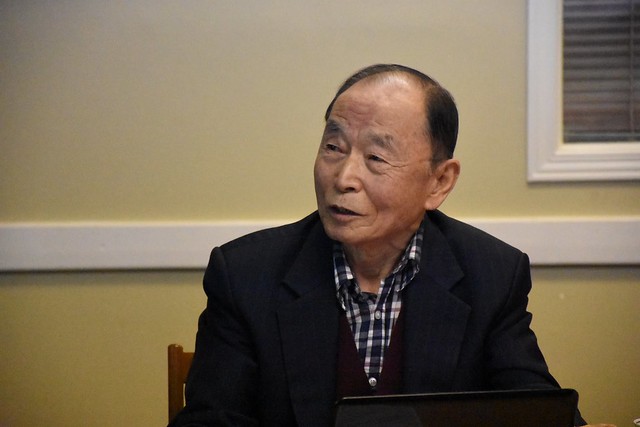Toronto, Canada—UPF-Canada held its monthly meeting for Ambassadors for Peace on the topic, “Post Modernism and Unificationism,” on December 12, 2015.
Muslim scholar and recording secretary of UPF-Canada’s Central District, Mr. Qamrul Khanson, served as the emcee. Rev. Mitch Dixon, co-chair of the chapter, opened the meeting with a report about the National Peace Conference 2015 held in Ottawa on November 13, and extended an invitation to the participants to attend the upcoming Interfaith Peace Blessing and celebration of UPF founders’ birthday on February 13.
In speaking about the marriage blessings, Rev. Dixon said that marriage is an institution between a man (husband) and a woman (wife), where affinity, love and unity are developed, which are also the binding factors of the family, race, societies, communities and nations. These groupings serve as the true foundation for humanity. Love, in men and women, grows through the three stages of formation, intimacy and finally, parental love, thereby strengthening the relations between the generations. The Peace Blessing is held to affirm and bolster this institution.
Mr. Khanson welcomed the keynote speaker, Dr. Chae Hee Lee, chair of UPF-Canada, who spoke on the topic, “Post Modernism and Unificationism.” Postmodernism, Dr. Lee said, came about in the late 20th-century and represents a rejection of modernism, which was a humanist philosophy of the Enlightenment; it is a cultural worldview that values spirituality, altruism and community.
Dr. Lee described UPF founder Rev. Dr. Sun Myung Moon as a “benevolent and conservative religious man.” He explained that the Divine Principle is the main theological basis of Unificationism. Following the format of systematic theology, it includes (1) God's purpose in creating human beings, (2) the fall of man and (3) restoration—the process through history by which God is working to remove the ill effects of the fall and restore humanity back to the relationship and position that God originally intended. The ideal of the family is at the core of the Principle. Through a revolution of conscience, Unificationism represents a grand paradigm, which promotes a culture of heart based on God’s love.
Following the presentation by Dr. Lee, the participants joined in a discussion.
Comments and suggestions were made by Dr. Golam Dastagir, visiting research scholar, University of Toronto, who proposed a gala dinner for future events. Mr. Abdul R. Qureshi appreciated the presentations. Ms. Tahira Qamar expressed her satisfaction over the discussions and exchange of knowledge, particularly with the aboriginal or indigenous Canadians. Dr. Tyron Childs and Dr. Taeho Han said they thought that the entire program was well organized. Mrs. Lilly Tadin thanked all the guests for attending and those who contributed their time to organize the event. Ms. Eveline Stewart encouraged feedback from the participants for ways to improve the programs.
Afterwards, the participants enjoyed a delicious lunch.

